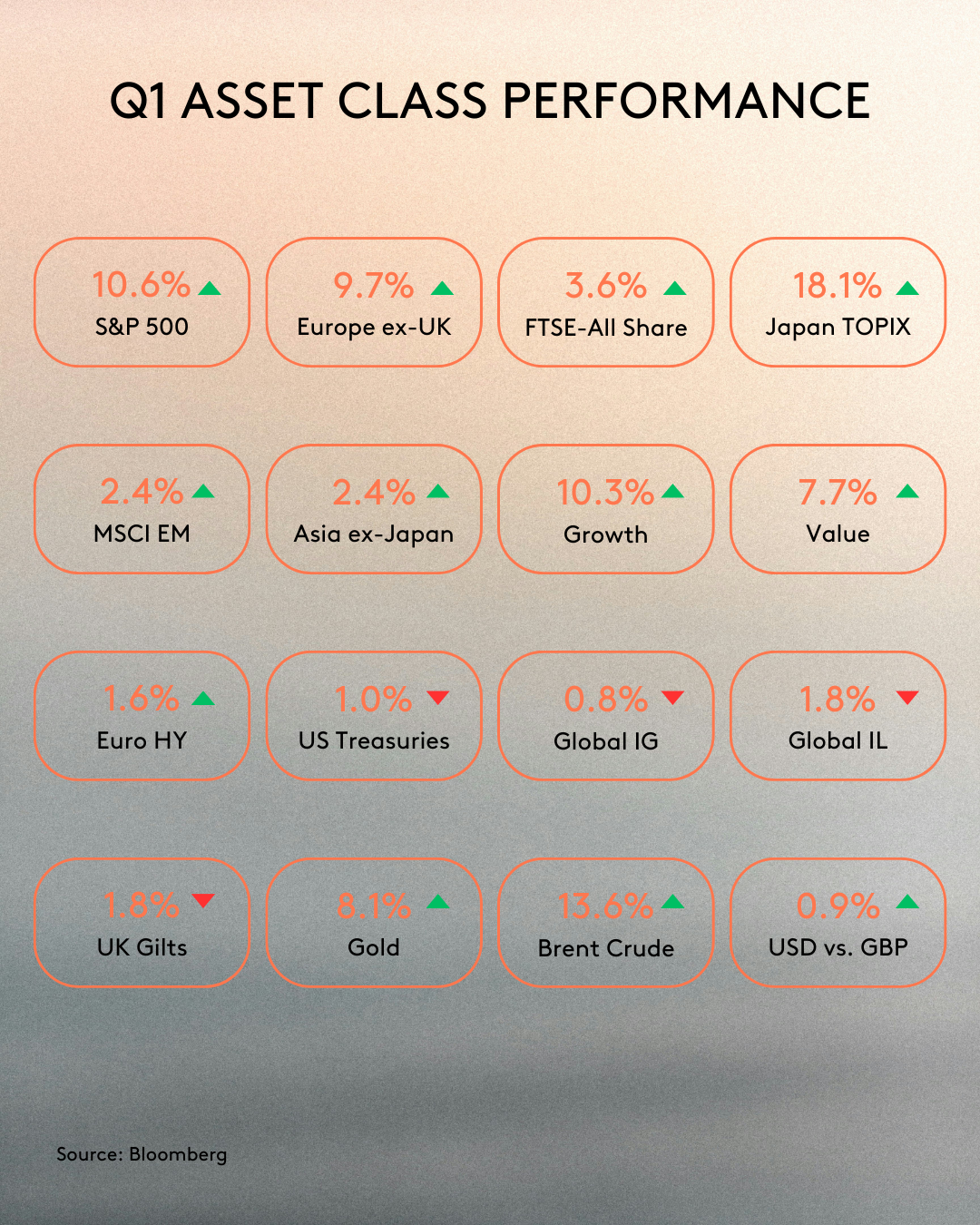Market Update March 2024
8 April 2024
Sign up to our newsletter for regular insights from the Hundle team.
Risk assets performed well during the first quarter of 2024, as key equity indices hit all-time highs. Equity investor sentiment was buoyed by the strength of the US economy and continued optimism about AI. While these forces served as positive tailwinds for stocks, the bond market reacted negatively to higher-than-expected inflation numbers and dampened expectations about the number of interest rate cuts anticipated this year.
ECONOMY
The outlook for the US economy remains positive. Q4 2023 GDP numbers came in ahead of expectations and this was followed by impressive PMI data. Inflation is proving stickier than the Federal Reserve would want, with three hotter-than-expected inflation readings during the first quarter. This has fed through into interest rate expectations. Market pricing suggests that the Federal Reserve will cut rates less than three time this year, starting in the summer, which stands in sharp contrast to the six-to-seven cuts priced at the end of 2023.
Outside of the US, we are seeing increasing evidence that the economic picture is starting to look brighter. Business confidence surveys are at an eight-month high, with the outlook for both the service and manufacturing sectors moving in the right direction. The purchasing manager indices compiled by S&P Global show the global economy back above the level of 50 that marks the division between expansion and contraction. Both the US and Chinese manufacturing sectors are contributing to the strength, although Europe is still lagging behind.

EQUITIES
US equity markets continue to deliver strong returns, with the S&P500 rising 10.6% despite higher Treasury yields and surging oil prices. Bullishness around generative artificial intelligence remains key to US stock returns, with Nvidia up 82% over the course of the quarter.
The so-called Magnificent Seven have underpinned US stock market strength over the past 12 months, however in Q1 we have seen growing evidence that performance is now starting to broaden out beyond these tech giants.
The Japanese equity market has continued its strong performance from 2023, with the TOPIX now up 18.1% year-to-date. These returns were achieved despite the Bank of Japan ending its negative interest rate policy and equity ETF purchases. We view the normalisation of monetary policy as supportive of Japanese equity market performance in the medium- to long-term and maintain our overweight exposure in client portfolios.
The MSCI Europe ex-UK index returned 9.4% in Q1. Although this performance lagged behind both the US and Japan, we maintain our positive outlook for European stocks and believe that the cheaper valuations on offer will become increasingly attractive to investors who are looking to re-deploy capital from markets where valuations look stretched.
Our investment team have spent considerable time this quarter looking at opportunities in emerging markets. The MSCI EM index returned 2.4% for the quarter, as Chinese stocks staged a recovery on the back of increased support from the People’s Bank of China and improved economic data. Despite this, we are looking outside China for our EM exposure. Our view is that despite attractive valuations China will continue to grapple with the fallout from the slowdown in its property market for the foreseeable future and we see compelling EM opportunities elsewhere.
—
FIXED INCOME
The strength of the US economy, coupled with hot inflation, resulted in investors dialling back expectations for the number of interest rate cuts this year. This translated into higher long-term yields, with the 10-year Treasury yield rising to 4.3%. This drove weaker performance from fixed income assets, with the Bloomberg Global Aggregate Index down 2.1%.
European sovereign bonds marginally outperformed US Treasuries, however UK Gilts remain a laggard on the back of hawkish commentary from the Bank of England who have been slower to bring inflation under control than their US and European counterparts.
In credit, European and US high yield outperformed investment grade due to lower interest rate sensitivity.
—
COMMODITIES & CURRENCIES
Commodity markets saw mixed performance, as the Bloomberg Commodity Index increased by 2.2%.
Gold hit a record high of $2,277, with the price of gold up by 9.1% in March alone. This occurred despite diminishing expectations of US rate cuts – higher rates act as a drag on gold, by elevating the opportunity cost of holding the precious metal. Gold’s ascent since mid-February could gain further strength if the Federal Reserve eases monetary policy later this year, which we still believe is likely.
Meanwhile, oil enjoyed a strong quarter as US crude futures surged to $85 a barrel for the first time since October last year. Oil prices have rallied amid OPEC+ production cuts, an improved economic outlook for China, and heightened geopolitical tensions.
Turning to currencies, the US dollar strengthened due to higher interest rate expectations. The dollar rallied against every other G10 currency, and the dollar index finished Q1 up 3.1%. Despite the Bank of Japan ending their negative interest rate policy, the yen weakened by 6.8% vs. the dollar. In part, that was because the Bank of Japan persisted with a dovish tone, saying they anticipated “that accommodative financial conditions will be maintained for the time being.”

PRIVATE MARKETS
Q1 was another busy period for our private markets team.
Due to a set of extraordinary circumstances, partly related to issues surrounding previous owners the Barclay brothers, Yodel was acquired by an online logistics marketplace called Shift, on a debt free, cash free basis, for a nominal sum.
Yodel is one of the largest logistics and delivery companies in the UK, with a 2023 turnover of around £550m. To support the continuation of normal operations and its regular working capital cycle, Hundle provided the company with a short-term financing facility of £8m, secured against their invoice book, which included many high-quality names such as Argos, Nespresso, and John Lewis.
Five weeks later, with the company having stabilised its operations, we have been refinanced by a traditional invoice discounting business who provided a £25m facility against the same names, at market rates.
Due to the tight timelines involved in this financing, we were able to agree attractive rates, with full seniority, and at low LTV to the invoice pool. Overall, investors who participated in the facility received a c.6% net cash return for a maximum 27-day term, or an annualised c.80% return.
We are pleased with the speedy execution and repayment of this facility, which generated attractive returns for investors who participated.

